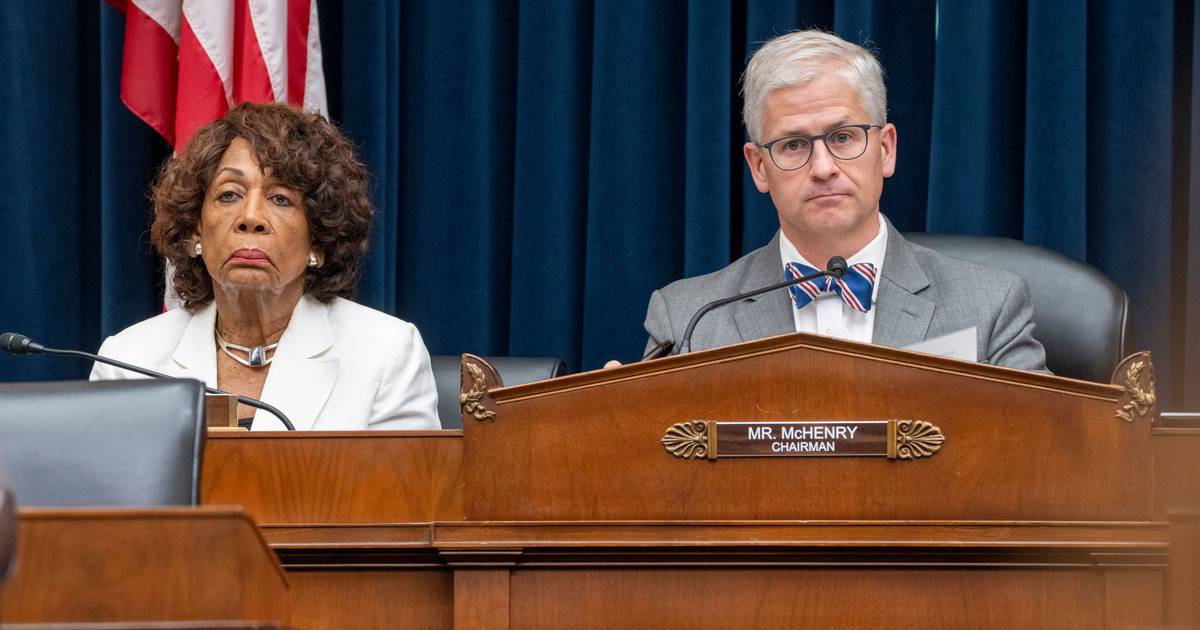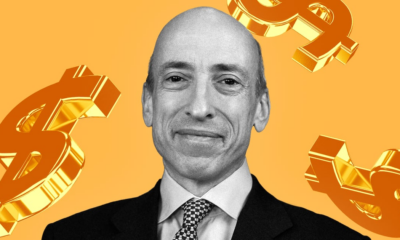Regulation
US House Passes Sweeping Cryptocurrency Bill FIT21 – DL News

- The cryptocurrency regulation bill passed by a bipartisan vote in the US House.
- The FIT21 bill promises to give commodities regulators greater oversight over digital assets.
- The bill may not advance to the next stage in the Senate.
- President Joe Biden does not support the bill but has said he will not veto it.
The US House of Representatives has voted to pass a landmark cryptocurrency bill as digital assets become a political talking point just months before a presidential election.
The Republican-led Financial Innovation and Technology for the 21st Century Act, known as the FIT21 Act, passed by a bipartisan vote of 279 to 136.
Specifically, 71 Democrats supported the bill, including former House Speaker Nancy Pelosi. Another 133 voted in opposition.
Among Republicans, only three voted in opposition. Another 208 supported the bill.
FIT21 promises to establish clear rules for digital assets long sought after by the cryptocurrency industry.
Hours before the vote, the Biden administration said it opposed the bill but did not threaten a veto — a relief for the industry.
The bill would end the “food fight for control” of cryptocurrencies being fought between the Securities and Exchange Commission and the Commodity Futures Trading Commission, said Republican Rep. Patrick McHenry of North Carolina, a co-sponsor of the bill, and chairman of the House Financial Services Committee.
“This is the most important moment in cryptocurrency policy and legislation in U.S. history so far,” said Rashan Colbert, head of policy at open source software developer and decentralized trading platform dYdX Trading. DL News.
Join the community to get our latest stories and updates
Senate challenge ahead
The FIT21 bill will then have to pass through the Senate. Upcoming elections mean priorities may change.
“There is a decent chance that progress will stop after this vote, but that doesn’t mean this is a futile exercise,” said Colbert, a former U.S. Senate staffer.
The progress is important symbolically, Colbert said, and demonstrates political will to regulate the digital asset market. He also creates a baseline for bipartisan agreement on how to regulate cryptocurrencies.
And even if the bill doesn’t pass in its current form, its provisions could be incorporated into other laws.
What’s in the bill
The bill is tailored to digital assets and offers an unprecedented framework for the sector. It passed the House Financial Services and Agriculture Committees in July with bipartisan support.
FIT21 establishes definitions for cryptocurrencies and divides responsibility between the Commodity Futures Trading Commission and the Securities and Exchange Commission.
The rules would give the CFTC, which is considered more industry-friendly, more jurisdiction over the sector. The definitions determine whether an asset will be subject to SEC or CFTC oversight.
Decentralized finance is outside the scope of the bill.
The rules would provide a “greater level of comfort knowing that we have the explicit authority to continue doing what we’re doing, which is really all they want right now,” Colbert said.
The vote comes on the heels of another political victory for cryptocurrencies. Last week, the U.S. House and Senate voted to repeal the SEC’s controversial accounting guidelines SAB121.
At the same time, the industry is anticipating regulatory approval of Ethereum spot exchange-traded funds.
More negative reaction
The White House he wrote in a memo on Wednesday it said the bill “in its current form does not have sufficient protections for consumers and investors who engage in certain digital asset transactions.”
But most notably, the White House has said it will work on developing a regulatory framework for digital assets with Congress.
Democratic Congresswoman Maxine Waters of California called FIT21 a “wish list of big cryptocurrencies and does not deserve our support.”
The bill’s impact isn’t limited to cryptocurrencies, Waters said Wednesday.
FIT21 would move cryptocurrencies and some traditional securities from SEC oversight into a “regulatory no-man’s land, with no primary regulator,” he said. He called it “the worst, most damaging proposal I’ve seen in a long time” and predicted a recession if it passed.
So did Massachusetts Democrat Stephen Lynch, who called it a “radical rewrite of this country’s securities laws.”
As the traditional financial markets and cryptocurrency markets begin to merge, he predicted that the volatility of the cryptocurrency market will lead to catastrophe for the traditional financial market.
“This will cause chaos in our financial markets, sooner or later,” Lynch said.
Although Wednesday’s comments fell along party lines — with Republicans supporting the bill and Democrats urging their colleagues to vote “No” — several Democrats expressed their support.
Representative Wiley Nickel, Democrat of North Carolina, said the United States is “relying on a 90-year-old securities law that was written before the Internet was even invented.”
“We can’t wait for the next FTX to go into action,” he added.
SEC Chairman Gary Gensler, considered an industry foe, said the bill poses a risk to markets and investors.
FIT 21 would “undermine decades of precedent regarding the oversight of investment contracts, placing investors and capital markets at immeasurable risk,” Gensler said in a declaration on Wednesday.
The SEC has indicted major industry players, including ConsensSys, CoinBase, KrakenAND The Robinhood Market crypto firms, with securities violations.
Industry experts say SEC requirements are not applicable or designed for issuers of digital assets.
“For too long, the U.S. digital asset ecosystem has been plagued by regulatory uncertainty that has stifled innovation and left consumers unprotected,” McHenry said in a press conference. declaration earlier this month.
Industry support
“The absence of clear rules creates confusion in the market for companies and leaves users and consumers without protection,” says the Blockchain Association he wrote in a letter to lawmakers in the Senate on Monday.
“This lack of clarity hinders innovation and hinders businesses, damaging America’s position in the global tech race.”
In a statement after the vote, Kristin Smith, CEO of the Blockchain Association, called the bill’s passage “a watershed moment and a sign of validation from Congress for the cryptocurrency industry in the United States.”
Last week, dozens of crypto firms, including Coinbase, Andreessen Horowitz and Kraken, signed an industry letter organized by the Crypto Council for Innovation in support of FIT21.
“The United States lags other major jurisdictions in developing a regulatory framework for digital assets,” the letter reads, adding that American innovators may migrate elsewhere.
“It is critical that the United States maintain its leadership in financial innovation.”
McHenry echoed the sentiment Wednesday.
“We are falling behind Europe,” he said. “This bill captures [us] so as not to lose ground in terms of innovation policy to the benefit of the Europeans, the UK, Singapore, Japan and Hong Kong.”
Update, May 22: This story has been updated to include the partisan divide in Congress’ vote for FIT21 and a statement from Blockchain Association CEO Kristin Smith.
Inbar Preiss is DL News’ regulatory correspondent. Contact the author at inbar@dlnews.com. Aleks Gilbert is DL News‘ New York-based DeFi correspondent. You can reach him at aleks@dlnews.com.
Regulation
Cryptocurrency Regulation in Slovenia 2024

Slovenia, a small but highly developed European country with a population of 2.1 million, boasts a rich industrial history that has contributed significantly to its robust economy. As the most economically developed Slavic nation, Slovenia has grown steadily since adopting the euro in 2007. Its openness to innovation has been a key factor in its success in the industrial sector, making it a favorite destination for cryptocurrency enthusiasts. Many believe that Slovenia is poised to become a powerful fintech hub in Europe. But does its current cryptocurrency regulatory framework support such aspirations?
Let’s explore Slovenia’s cryptocurrency regulations and see if they can push the country to the forefront of the cryptocurrency scene. My expectations are positive. What are yours? Before we answer, let’s dig deeper.
1. Cryptocurrency Regulation in Slovenia: An Overview
Slovenia is known for its pro-innovation stance, providing a supportive environment for emerging technologies such as blockchain and cryptocurrencies. Under the Payment Services and Systems Act, cryptocurrencies are classified as virtual assets rather than financial or monetary instruments.
Regulation of the cryptocurrency sector in Slovenia is decentralized. Different authorities manage different aspects of the ecosystem. For example, the Bank of Slovenia and the Securities Market Agency supervise cryptocurrency transactions to ensure compliance with financial laws, including anti-money laundering (AML) and counter-terrorist financing regulations. The Slovenian Act on the Prevention of Money Laundering and Terrorist Financing (ZPPDFT-2) incorporates the EU’s Fifth Anti-Money Laundering Directive (5MLD) and aligns with the latest FATF recommendations. All virtual currency service providers must register with the Office of the Republic of Slovenia.
2. Cryptocurrency regulation in Slovenia: what’s new?
This year, there have been several noteworthy developments in the cryptocurrency sector in Slovenia:
July 25, 2024: Slovenia has issued a €30 million on-chain sovereign digital bond, the first of its kind in the EU, with a yield of 3.65%, maturing on 25 November 2024.
May 14, 2024: NiceHash has announced the first Slovenian Bitcoin-focused conference, NiceHashX, scheduled for November 8-9 in Maribor.
3. Explanation of the legal framework for cryptocurrency taxation in Slovenia
Slovenia’s cryptocurrency tax framework provides clear guidelines for both individuals and businesses. According to the Slovenian Tax Administration, tax treatment depends on the status of the trader and the nature of the transaction.
- Individuals: Income earned from cryptocurrencies through employment or ongoing business activities is subject to personal income tax. However, capital gains from trading or market fluctuations are exempt from taxation.
- Society: Capital gains from cryptocurrency activities are subject to a corporate income tax of 19%. Value added tax (VAT) generally applies at a rate of 22%, although cryptocurrency transactions considered as means of payment are exempt from VAT. Companies are not allowed to limit payment methods to cryptocurrencies only. Tokens issued during ICOs must comply with standard accounting rules and the Corporate Tax Act.
4. Cryptocurrency Mining in Slovenia: What You Should Know
Cryptocurrency mining is not restricted in Slovenia, but the income from mining is considered business income and is therefore taxable. This includes rewards from validating transactions and any additional income from mining operations. Both natural persons and legal entities must comply with Slovenian tax regulations.
5. Timeline of the evolution of cryptocurrency regulations in Slovenia
Here is a timeline highlighting the evolution of cryptocurrency regulations in Slovenia:
- 2013:The Slovenian Tax Administration has issued guidelines according to which income from cryptocurrency transactions should be taxed.
- 2017:The Slovenian Tax Administration has provided more detailed guidelines on cryptocurrency taxation, based on factors such as the trader’s status and the type of transaction.
- 2023The EU has adopted the Markets in Cryptocurrencies Regulation (MiCA), which establishes a uniform regulatory framework for cryptocurrencies, their issuers and service providers across the EU.
Final note
Slovenia’s approach to the cryptocurrency industry is commendable, reflecting its optimistic view of the future of cryptocurrency. The country’s balanced regulatory framework supports cryptocurrency innovation while protecting user rights and preventing illegal activities. Recent developments demonstrate Slovenia’s commitment to continuously improving its regulatory environment. Slovenia’s cryptocurrency regulatory framework sets a positive example for other nations navigating the evolving cryptocurrency landscape.
Read also: Cryptocurrency Regulation in Hong Kong 2024
Regulation
A Blank Slate for Cryptocurrencies: Kamala Harris’ Regulatory Opportunity

Photo by The Dhage of Shubham ON Disinfect
As the cryptocurrency landscape continues to evolve, the need for clear regulation has never been greater.
Vice President Kamala Harris is now leading the charge on digital asset regulation in the United States, presenting a unique opportunity for a clean slate. This fresh start can foster innovation and protect consumers. It can also pave the way for widespread adoption across industries, including real estate agencies, healthcare providers, and online gambling platforms like these online casinos in the uk. According to experts at SafestCasinoSites, these platforms have advantages such as bonus offers, a wide selection of games, and various payment methods. Ultimately, all this increased adoption could push the cryptocurrency market forward.
With that in mind, let’s take a look at the current state of cryptocurrency regulation in the United States, which is a complex and confusing landscape. Multiple agencies, including the Securities and Exchange Commission (SEC), the Commodity Futures Trading Commission (CFTC), and the Financial Crimes Enforcement Network (FinCEN), have overlapping jurisdictions, creating a fragmented regulatory environment. This lack of clarity has hindered innovation, as companies are reluctant to invest in the United States, fearing regulatory repercussions. A cohesive and clear regulatory framework is urgently needed to unlock the full potential of cryptocurrencies in the United States.
While the US struggles to find its footing, other countries, such as Singapore and the UK, are actively embracing the cryptocurrency industry with clear and supportive regulatory frameworks. This has led to a brain drain, with companies opting to set up in more hospitable environments.
Vice President Kamala Harris has a unique opportunity to change this narrative and clean up the future. cryptocurrency regulation. By taking a comprehensive and inclusive approach, it can help create a framework that balances consumer protection with innovation and growth. The time has come for clear and effective regulation of cryptocurrencies in the United States.
Effective regulation of digital assets is essential to fostering a safe and innovative environment. Key principles guiding this regulation include clarity, innovation, global cooperation, consumer protection, and flexibility. Clear definitions and guidelines eliminate ambiguity, while encouraging experimentation and development to ensure progress. Collaboration with international partners establishes consistent standards, preventing regulatory arbitrage. Strong safeguards protect consumers from fraud and market abuse, and adaptability allows for evolution in response to emerging trends and technologies, striking a balance between innovation and protection.
The benefits of effective cryptocurrency regulation are many and far-reaching. By establishing clear guidelines, governments can attract investors and traditional users, spurring growth and adoption. This, in turn, can position countries like the United States as global leaders in financial technology and innovation. Strong protections will also increase consumer confidence in digital assets and related products, boosting economic activity.
A thriving cryptocurrency industry can significantly contribute to GDP and job creation, which has a positive impact on the overall economy. Furthermore, effective regulation has paved the way for the growth of many companies such as tech startups, online casinos, and pharmaceutical companies, proving that clear guidelines can unlock new opportunities without stifling innovation. This is a great example of how regulation can alleviate fears of regressive policies, even if Kamala Harris does not repeal the current progressive approach. By adopting effective regulation, governments can create fertile ground for the cryptocurrency industry to thrive, driving progress and prosperity.
Regulation
Think You Own Your Crypto? New UK Law Would Ensure It – DL News

- The UK Law Commission has developed a bill that will address a situation of legal uncertainty.
- The commission’s goal is to ensure that cryptocurrencies are legally treated as personal property.
UK law is not entirely clear whether cryptocurrencies can be considered personal property.
This is according to the UK Law Commission, which argues that while most investors assume that when they buy cryptocurrencies, they are “acquiring property rights in the same way as buying, say, a watch or a laptop.”
“As the law currently stands, this is not necessarily the case,” the respected legal body said in a new report on Tuesday.
The report was accompanied by a solution: a new bill to consolidate the legal status of digital assets as personal property.
This could be huge for the estimated 4.7 million Britons valued hold cryptocurrencies.
“This will allow the courts to determine a range of issues,” the report says.
If passed, the law would help clarify how cryptocurrencies are treated in cases of bankruptcy, estate planning or theft.
Flexible law
The commission is an independent body responsible for reviewing UK law. It began investigating whether English and Welsh property laws apply to digital assets in 2020.
Join the community to receive our latest stories and updates
At the time, then-Chancellor of the Exchequer Rishi Sunak expressed ambitions to transform the UK into a cryptocurrency hub as Britons invested more.
In 2023, the commission decided that, in most cases, the legislation of England and Wales is sufficiently flexible to regulate cryptocurrencies.
This means that any asset, from Bitcoin to non-fungible tokens and some types of digital contracts, can be considered personal property, without Parliament having to write extensive new laws.
There was one small area of uncertainty, however: it was unclear whether cryptocurrencies fell within the two categories of personal property recognised under UK law.
These two categories are made up of tangible assets (cars, laptops, bags) and intangible assets (contracts, stocks, and debt).
The bill that will now go to Parliament to be converted into law aims to remedy this situation.
Without that clarification, courts may try to lump cryptocurrencies together with intangible assets, said Adam Sanitt, head of litigation, knowledge, innovation and corporate support EMEA at law firm Norton Rose Fulbright. DL News in March.
This is problematic because intangible assets are creations of the legal system, while cryptocurrencies are not.
“How the law treats digital assets, what rights you have over them, how you own them, how you transfer them to other people—that treatment is different, because digital assets don’t exist by virtue of the legal system, but independently of it,” Sanitt said.
The money in your bank account, for example, is a legal creation. The government could pass a law to cancel it.
However, if the UK passed a law banning Bitcoin, Bitcoin would not cease to exist.
Sanitt said: “That’s why digital assets are so important: neither the government nor the legal system can take them away from you.”
Contact the author at joanna@dlnews.com.
Regulation
The Solution the Cryptocurrency Industry Needs

The cryptocurrency industry has performed remarkably well since its inception, but now faces a critical hurdle that requires careful consideration and regulatory expertise to overcome. Despite the industry’s rapid growth and rate of global adoption, the gap between the industry and global regulation is only widening as new innovations break through into the public domain.
Although efforts are being made on both sides, regulators’ lack of familiarity with cryptocurrencies and the industry’s lack of regulatory expertise are hindering innovation in the sector. To address this issue, traditional financial institutions (TradFi) such as MultiBank Group have started venturing into the cryptocurrency sector.
The regulatory gap
Over the past decade, the cryptocurrency industry has grown dramatically as tech entrepreneurs and forward-thinking thinkers have founded a plethora of crypto platforms and protocols to push the boundaries of the space. The problem faced by these newcomers, who are often unfamiliar with the hurdles posed by financial regulators, can quickly overwhelm and stall operations.
On the other hand, regulators more attuned to TradFi systems may be equally stifled by the complexities of decentralization and blockchain technology. The unfamiliarity experienced by both innovators and regulators creates a stark regulatory divide between both sides, leading to misunderstandings and potential conflicts.
To overcome this lack of communication, a bridge must be built to bridge the gap, ensuring future stability for the cryptocurrency industry and clearer legislation from regulators.
Efforts to bridge the gap between industry
The gap between the cryptocurrency industry and regulators is slowly narrowing as efforts to regulate cryptocurrencies and Web3 space activities are gaining momentum. Specific regulatory actions are taking place in many countries, aimed at providing greater oversight of cryptocurrency transactions, cryptocurrency exchanges, and initial coin offerings (ICOs).
Despite being a positive step in the right direction, these new regulations can differ significantly between jurisdictions around the world. This fragmentation results in a regulatory environment filled with obstacles, bottlenecks, and varying requirements and prohibitions. As cryptocurrency companies and TradFi institutions attempt to navigate the minefield, the regulatory maze becomes increasingly convoluted.
TradFi institutions like MultiBank Group are working to solve this problem, as one of the largest financial derivatives institutions in the world with over 12 licenses across all continents. Founded in 2005, the Group has an impeccable and trustworthy reputation globally, extensive expertise in financial regulation and has now ventured into the cryptocurrency space via MultiBank.io.
MultiBank.io: TradFi Excellence in the Crypto Space
Expanding into the cryptocurrency space via MultiBank.io has enabled MultiBank Group to provide regulatory clarity and trust to the digital asset industry. With a substantial daily trading volume of $12.1 billion, the timely decision to enter the cryptocurrency space has the potential to set regulatory precedents and standards for years to come.
By helping to develop sensible and well-considered regulations, MultiBank.io’s established reputation allows the company to communicate effectively and clearly with regulators. Unlike others in the industry without regulatory expertise, MultiBank.io facilitates the Group’s commitment to rigorous regulatory standards, the scope of oversight and establishes the necessary transparency.
The company’s approach ensures that regulatory licenses are pre-acquired, compliance is met globally without jurisdictional barriers, and transactions remain secure at all times. By helping to create robust regulations that are both clear and innovation-friendly, MultiBank Group looks forward to standardizing the entire cryptocurrency industry for other potential innovators.
One of the biggest challenges in establishing a clearly constructed bridge between regulators and the cryptocurrency industry is effective communication. By leveraging its institutional background TradFi and acting as an intermediary with regulators, MultiBank Group is able to translate the needs of the industry to those who shape it.
This quality of mediation is essential to ensure that regulation helps develop essential technological advances rather than hinders their establishment and growth. Through the lens of TradFi when looking at the complexity of the cryptocurrency industry, MultiBank Group is able to deconstruct unfamiliar crypto arguments for regulation and create a safer and more secure space.
Where TradFi and Crypto Meet
Regulations are crucial for traders, investors, and everyday users of crypto platforms and their safety when participating in crypto markets. While strict regulations are necessary for stable market integrity, innovation should still be considered, something MultiBank Group considers a priority.
Where TradFi and cryptocurrencies converge, the Group is there to provide a balanced approach to ensure promotion for both the cryptocurrency industry and regulators seeking to protect both retail and institutional investors. This balance is critical to maintaining a thriving space where cryptocurrency innovation can thrive without compromising the security of user funds or data.
As more TradFi institutions like MultiBank Group enter the cryptocurrency space with ever-expanding expertise in regulatory understanding, the future of the industry is increasingly encouraged. The financial freedoms of the cryptocurrency space coupled with regulatory oversight for financial security will be the guiding lights for the future success of the entire cryptocurrency industry.
No spam, no lies, just insights. You can unsubscribe at any time.
-

 Ethereum10 months ago
Ethereum10 months agoEthereum Posts First Consecutive Monthly Losses Since August 2023 on New ETFs
-

 Regulation10 months ago
Regulation10 months agoCryptocurrency Regulation in Slovenia 2024
-

 News10 months ago
News10 months agoNew bill pushes Department of Veterans Affairs to examine how blockchain can improve its work
-

 Regulation10 months ago
Regulation10 months agoThink You Own Your Crypto? New UK Law Would Ensure It – DL News
-

 Regulation10 months ago
Regulation10 months agoA Blank Slate for Cryptocurrencies: Kamala Harris’ Regulatory Opportunity
-

 Regulation10 months ago
Regulation10 months agoUpbit, Coinone, Bithumb Face New Fees Under South Korea’s Cryptocurrency Law
-

 Regulation10 months ago
Regulation10 months agoBahamas Passes Cryptocurrency Bill Designed to Prevent FTX, Terra Disasters
-

 Regulation10 months ago
Regulation10 months agoIndia to Follow G20 Policy for Cryptocurrency Regulation: MoS Finance
-

 Ethereum1 year ago
Ethereum1 year agoComment deux frères auraient dérobé 25 millions de dollars lors d’un braquage d’Ethereum de 12 secondes • The Register
-

 Videos1 year ago
Videos1 year agoNexus Chain – Ethereum L2 with the GREATEST Potential?
-

 News10 months ago
News10 months agoEU supports 15 startups to fight online disinformation with blockchain
-

 Ethereum1 year ago
Ethereum1 year agoScaling Ethereum with L2s damaged its Tokenomics. Is it possible to repair it?

















